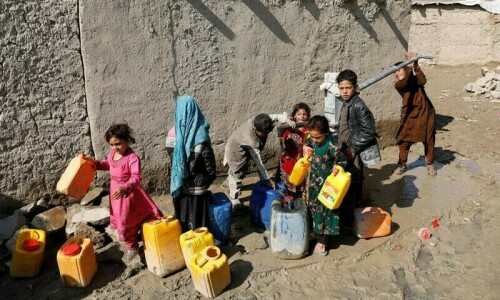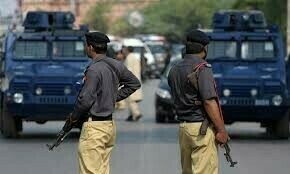KARACHI, Oct 2: The youth is interested. The Pakistan Football Federation (PFF) is ready to invest in the youth. But where are the academies?
“Under the FIFA Goal Project, we’re looking at setting up academies in five different cities namely Karachi, Sukkur, Jacobabad, Quetta and Lahore,” PFF secretary Col Ahmed Yar Khan Lodhi tells Dawn.
“The academies are set to be inaugurated later this year. This would be just one step in our commitment towards youth development in the country.”
With the youth’s inclination towards football reaching an all-time high, it is time Pakistan starts harnessing that interest into something more fruitful.
Or, like in the past, Pakistan risks losing another generation of footballers who — if given proper training – could’ve turned out to be world-beaters.
“You have to nurture a professional player,” former Pakistan coach Tariq Lutfi says. “You have to nurture him from the very beginning — the moment you see that he has potential.
“For that, a very strong academy set-up is required. In the recent past, not much work has been done on setting up state-of-the-art academies and as a result a lot of top talent has gone to waste.”PFF chief Faisal Saleh Hayat hopes the interest in the game will help Pakistan qualify for the 2022 FIFA World Cup.
But in modern day football, interest amongst youth doesn’t take a nation that far.
“Our policy is to invest in the youth, build academies and start scholarship programmes that inspire the youngsters in the country to not just only watch the game but also take it up professionally,” Faisal told Dawn.
The difficult part, though, is to attract a generation of youngsters whose first experience of watching football is of Europe’s top clubs — youngsters for whom Lionel Messi and Cristiano Ronaldo are role-models; not Mohammad Essa or Kaleemullah.
VAST POTENTIAL
While the Pakistan Premier Football League (PPFL) does not enjoy any air-time in the local media, ratings for UEFA Champions League games have soared.
And Pakistan’s international defender Zesh Rehman believes the solution is to bring foreign football academies to the country.
“To bring youngsters out of their houses and onto the field, Pakistan needs to work on bringing foreign academies — or football schools of big European clubs — to the country,” the former Fulham defender told Dawn.
“The talent is already here, all that it needs is harnessing,” the Kitchee centre-back added.
Pakistan have shown their youngsters can compete with Asia’s top sides in recent times. Last week, the Pakistan U-16 team lost 2-0 to Iran in an AFC U-16 Championship qualification match in Lahore.
Although they failed to qualify from Group ‘E’, they drew a lot of praise for their performance by their more illustrious neighbours.
“Pakistan have shown they can compete with the best in Asia,” said iran coach Mostafa Ghanbarpour. “They have the required talent to grow into one of the top teams of the future.”
Now is the challenge to groom talent in the U-14 and U-16 levels into world-beaters and capitalize on the rising interest in football in the country.
According to Zesh, if Pakistan hope to be amongst the best in Asia — which they will need to in order to reach the World Cup — they need a talent pool which has an ever-running supply of quality players.
For that, five PFF academies won’t be enough.
While the PFF academies will only house a select few who have caught the eye, tapping into the country’s vast reserve of football talent will require foreign foundations to come to the country.
“Foreign foundations have to come to Pakistan in order for football here to grow,” Zesh said.
“When they come, they will serve as a magnet to attract aspiring footballers to come and train so not only the PFF will have youngsters which it has already selected but also a pool of players which is being groomed at these academies.
“With the help of these academies, the best talent in the country can also be sent abroad for further training.”
For a start, Zesh plans on bringing his own Zesh Rehman Foundation (ZRF) to the country.
“We’re in talks with the PFF,” he informed. “We plan to hold football clinics in Lahore and Karachi this year and then try giving Pakistani talent some exposure in England.”
With that initiative, it is hoped other foreign foundations would also step into Pakistan.
SECURITY CONCERNS
Security in the country, however, is an issue.
Pakistan has been bereft of international sports since the Lahore attacks on the touring Sri Lankan cricket team four years ago.
On that fateful day on March 3, 2009, the Sri Lankan team was on their way to the Gaddafi Stadium for the third day of their second Test when militants opened fire and threw grenades at their bus, killing eight people.
International sport has since returned in bits and pieces.
The recent AFC U-16 Championship qualifiers, though, were a breath of fresh air for a country where international sport seems to have stagnated to alarming levels.
Ghanbarpour was full of praise for the PFF for organising the qualification round in a befitting manner.
“I thank the PFF for holding a remarkably awesome event,” said Ghanbarpour in his final press-conference. “Everything was excellent — the security, facilities and the matches were good.”
The PFF, meanwhile, hopes this could be the start of something good — something that will see top European clubs form academies here and in turn boost youth development here.
“We’ve already shown that we can guarantee safety if teams wish to come here,” says Faisal. “If they [European clubs] could set up academies here, like they have in India, it will be a big boost for youth development here.”
India has seen Manchester United set up their Soccer School in Mumbai with clubs like Barcelona and Liverpool following suit.
Faisal is hoping companies who have linkages with these clubs can contribute.
“There are several companies here who can help us out and we have spoken to them to arrange coaching clinics in collaboration with us,” he adds.
COROPORATE COLLABORATIONS
Last year, cellular company ZONG — who have a three-year partnership with United for the club’s promotional activities in the country — sent 32 aspiring young players for a week-long training camp at the Manchester United Soccer Academy in Dubai after country-wide trials in Pakistan.
While it was a select-few who got a chance to train and learn at the best facilities, a lot were left behind.
Why can ZONG not organise a training camp here with coaches from the United Academy?
“We can ask them to come and we might as well receive a favourable response from them,” ZONG’s Corporate Communications Director Farooq Niaz told Dawn earlier this year.
“If the security situation in Pakistan was better, they would’ve come here with their coaches for a greater benefit.”
One thing which is more certain to happen, though, is the opening of a football academy by the Real Madrid Foundation in the country by next year.
In November last year, Aman Sports, a subsidiary of local NGO Aman Foundation, signed a MoU with the Los Galacticos to set up two football academies in Pakistan.
“Two representatives from the Aman Foundation have already been selected by the Real Madrid Foundation and they will be trained in the Spanish capital before they come here to coach in the AMAN Sports-Real Madrid academy which will be opened during the course of the 2013-14 season,” Director of Aman Sports Faisal Mirza tells Dawn.
Could a few of their star players come at the opening of the academy?
“It would of course be fantastic if Cristiano Ronaldo could come during the opening of the academy,” Mirza says, referring to Real’s star Portuguese attacker.
“The clubs of course are a little apprehensive about sending their stars to a place which isn’t secure. It is possible for them to visit, though, if we give them a positive feedback over security.”
The PFF, meanwhile, is willing to help in making it happen.
“We are ready to help if these companies want our support for the growth of football,” Faisal says. “I personally think that if a few foreign stars come here and academies open up here, it could be the catalyst Pakistan football needs.”
Note: This concludes a two-part series in which Dawn examined why the rising interest in football in Pakistan has not transformed into better results at the international level.
















































